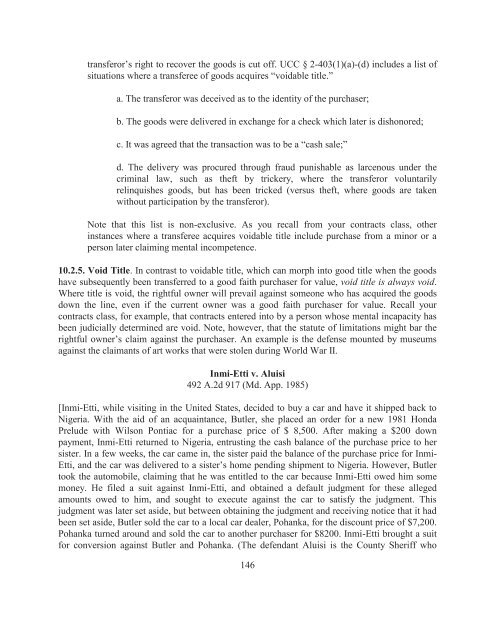Sales and Leases - A Problem-based Approach, 2016a
Sales and Leases - A Problem-based Approach, 2016a
Sales and Leases - A Problem-based Approach, 2016a
Create successful ePaper yourself
Turn your PDF publications into a flip-book with our unique Google optimized e-Paper software.
transferor’s right to recover the goods is cut off. UCC § 2-403(1)(a)-(d) includes a list of<br />
situations where a transferee of goods acquires “voidable title.”<br />
a. The transferor was deceived as to the identity of the purchaser;<br />
b. The goods were delivered in exchange for a check which later is dishonored;<br />
c. It was agreed that the transaction was to be a “cash sale;”<br />
d. The delivery was procured through fraud punishable as larcenous under the<br />
criminal law, such as theft by trickery, where the transferor voluntarily<br />
relinquishes goods, but has been tricked (versus theft, where goods are taken<br />
without participation by the transferor).<br />
Note that this list is non-exclusive. As you recall from your contracts class, other<br />
instances where a transferee acquires voidable title include purchase from a minor or a<br />
person later claiming mental incompetence.<br />
10.2.5. Void Title. In contrast to voidable title, which can morph into good title when the goods<br />
have subsequently been transferred to a good faith purchaser for value, void title is always void.<br />
Where title is void, the rightful owner will prevail against someone who has acquired the goods<br />
down the line, even if the current owner was a good faith purchaser for value. Recall your<br />
contracts class, for example, that contracts entered into by a person whose mental incapacity has<br />
been judicially determined are void. Note, however, that the statute of limitations might bar the<br />
rightful owner’s claim against the purchaser. An example is the defense mounted by museums<br />
against the claimants of art works that were stolen during World War II.<br />
Inmi-Etti v. Aluisi<br />
492 A.2d 917 (Md. App. 1985)<br />
[Inmi-Etti, while visiting in the United States, decided to buy a car <strong>and</strong> have it shipped back to<br />
Nigeria. With the aid of an acquaintance, Butler, she placed an order for a new 1981 Honda<br />
Prelude with Wilson Pontiac for a purchase price of $ 8,500. After making a $200 down<br />
payment, Inmi-Etti returned to Nigeria, entrusting the cash balance of the purchase price to her<br />
sister. In a few weeks, the car came in, the sister paid the balance of the purchase price for Inmi-<br />
Etti, <strong>and</strong> the car was delivered to a sister’s home pending shipment to Nigeria. However, Butler<br />
took the automobile, claiming that he was entitled to the car because Inmi-Etti owed him some<br />
money. He filed a suit against Inmi-Etti, <strong>and</strong> obtained a default judgment for these alleged<br />
amounts owed to him, <strong>and</strong> sought to execute against the car to satisfy the judgment. This<br />
judgment was later set aside, but between obtaining the judgment <strong>and</strong> receiving notice that it had<br />
been set aside, Butler sold the car to a local car dealer, Pohanka, for the discount price of $7,200.<br />
Pohanka turned around <strong>and</strong> sold the car to another purchaser for $8200. Inmi-Etti brought a suit<br />
for conversion against Butler <strong>and</strong> Pohanka. (The defendant Aluisi is the County Sheriff who<br />
146


















